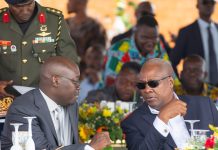The Bank of Ghana (BoG) has assured the business community that it has sufficient reserves to manage the Cedi-Dollar volatilities.
The Governor of the Bank of Ghana, Dr. Ernest Addison, who doubles as the Chairman of the Monetary Policy Committee (MPC) made this known at a press briefing in Accra yesterday, May 27, 2024.
According to Dr. Addison, “despite these pressures on the foreign exchange rate, the Bank of Ghana, however, has adequate reserves to manage these shocks to the foreign exchange market, having added over US$600.0 million to the current foreign exchange reserve levels over the first five months of the year.”
Dr. Addison also added that the improved reserves position is also backed by strong liquid monetary gold levels of over 26.6 tonnes (estimated at US$2.1 billion) as a result of the very successful domestic gold purchase programme.
Impact of Global Economic Trends
Dr. Addison continued that the global economic activity remains strong, particularly in large economies, even as monetary policies remain tight.
However, escalating geopolitical tensions have led to rising oil prices, stalling progress towards achieving global inflation targets. Emerging markets and developing economies, including Ghana, face additional challenges due to the strengthening of the US dollar and the tight monetary policy stance of the U.S. Federal Reserve.
He explained that these developments have created headwinds for the disinflation process, prompting central banks worldwide to maintain a cautious stance on loosening monetary policies. In the outlook, however, central banks are expected to begin easing policies once inflation shows a steady decline towards target levels.
Domestic Economic Indicators and Sector Performance
The BoG’s high-frequency real sector indicators reveal a steady improvement in the country’s economic activity. This is evidenced by continued growth in the Composite Index of Economic Activity (CIEA) and a firming up of the Purchasing Managers’ Index (PMI), driven by resilient consumer demand.
Conversely, real private sector credit remains weak, with business and consumer confidence softening due to concerns over high raw material costs and foreign exchange market pressures. Nonetheless, Ghana’s external sector position remains strong, although the current account surplus nearly halved in the first quarter of the year, reflecting a rebound in imports and net income payments.
Strategic Gold Purchases and Reserve Management
The Governor indicated that the domestic gold purchase program has been a key contributor to the reserve accumulation.
By the end of April 2024, the central bank’s reserves stood at 3.0 months of import cover, bolstered by strong liquid monetary gold levels of over 26.6 tonnes, estimated at US$2.1 billion.
“The improved reserves position is also backed by strong liquid monetary gold levels as a result of the very successful domestic gold purchase programme,” added Dr Addison.
“This strategy has significantly enhanced our reserve buffers, ensuring we can effectively manage exchange rate pressures.”
Foreign Exchange Market Challenges
The recent pressures on the exchange rate are attributed to a weakening current account surplus, driven by higher import demand and lower export revenue, particularly from a sharp fall in cocoa export earnings, according to the Governor.
Additionally, robust public spending on IPP arrears payments and capital expenditure outlays have further strained the foreign exchange market.
The BoG has observed increased pressures from importers diverting foreign exchange demand into informal markets, raising speculative demand.
To address these challenges, the BoG has implemented several measures to stabilize the market and improve market conduct.
Measures to Stabilise the Foreign Exchange Market
To mitigate high demand pressures, the BoG has taken steps to directly absorb foreign exchange needs of some corporate institutions, reducing pipeline demand from commercial banks. The central bank is also intensifying efforts to monitor and regulate the activities of foreign exchange bureaux, working closely with the Financial Intelligence Centre to sanitize the market.
“Foreign exchange bureaux must immediately desist from advertising rates outside their premises and on social media platforms,” warned Dr. Addison. “We have set up a task force to monitor compliance and ensure that the foreign exchange market operates within the regulatory framework.”
Fiscal Discipline and Economic Stability
On the fiscal front, the governor acknowledged that expenditures outpaced revenue growth in the first quarter of 2024 due to the frontloading of IPP arrears payments.
Maintaining strict fiscal discipline for the remainder of the year, he said, is crucial to bolster confidence in the economy.
“Maintaining fiscal discipline will be key to strengthening confidence in our economy,” emphasized Dr. Addison. “We need to ensure that recent currency depreciation does not become embedded into business pricing behaviors and inflation expectations.”
Inflation Forecast and Monetary Policy
The central bank’s latest forecast shows a slightly elevated inflation profile due to recent exchange rate pressures and adjustments in transportation fares.
However, projections indicate that inflation will remain within the monetary policy consultation clause of 13-17 percent by the end of the year, contingent on sustaining the tight monetary policy stance.
“The Committee decided to maintain the Monetary Policy Rate at 29.0 percent, reflecting our commitment to managing current economic challenges effectively” concluded Dr. Addison.
“Our strong reserve position and strategic interventions are pivotal in ensuring the stability of the cedi and fostering a resilient economic environment for Ghana.”









